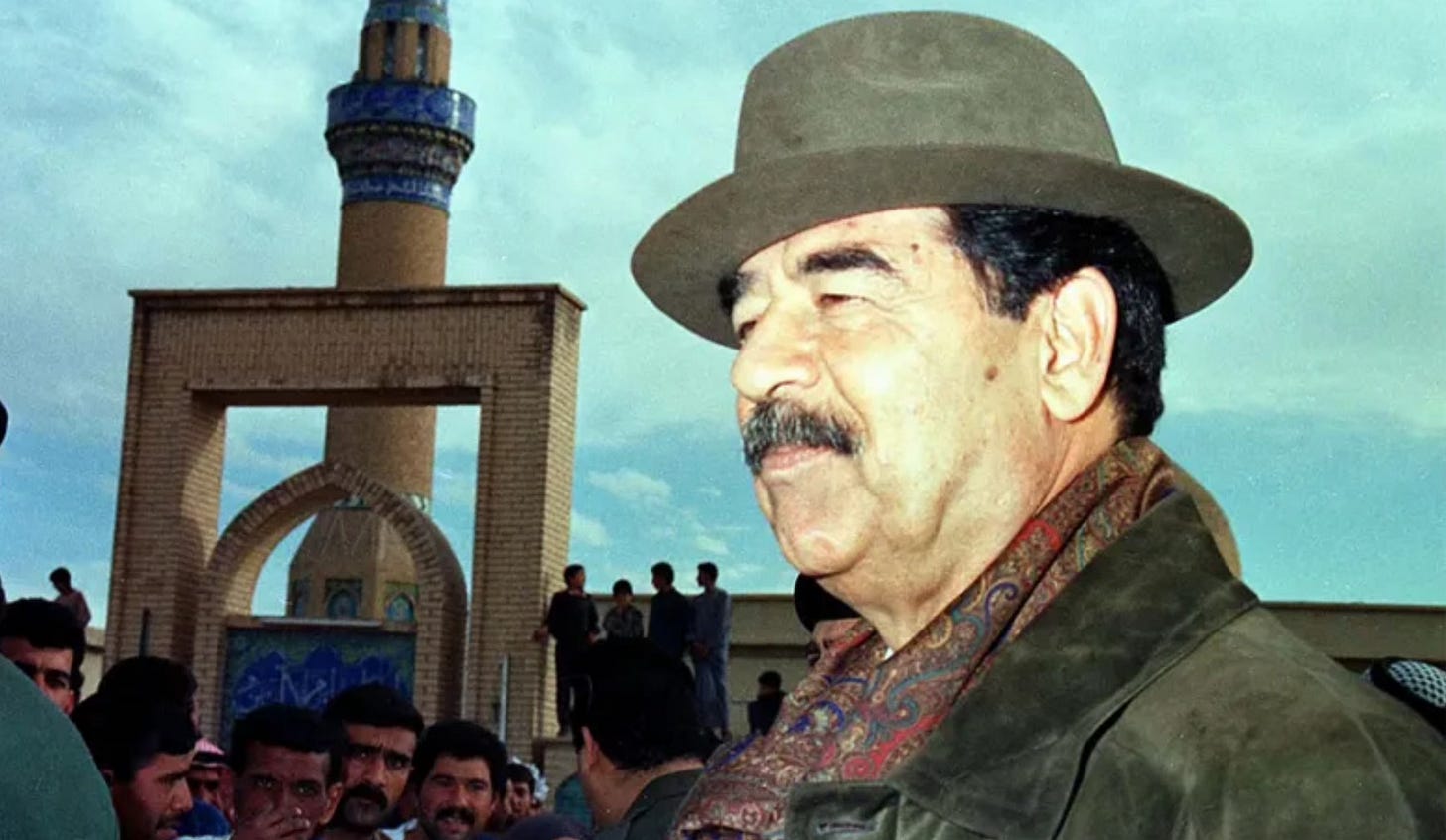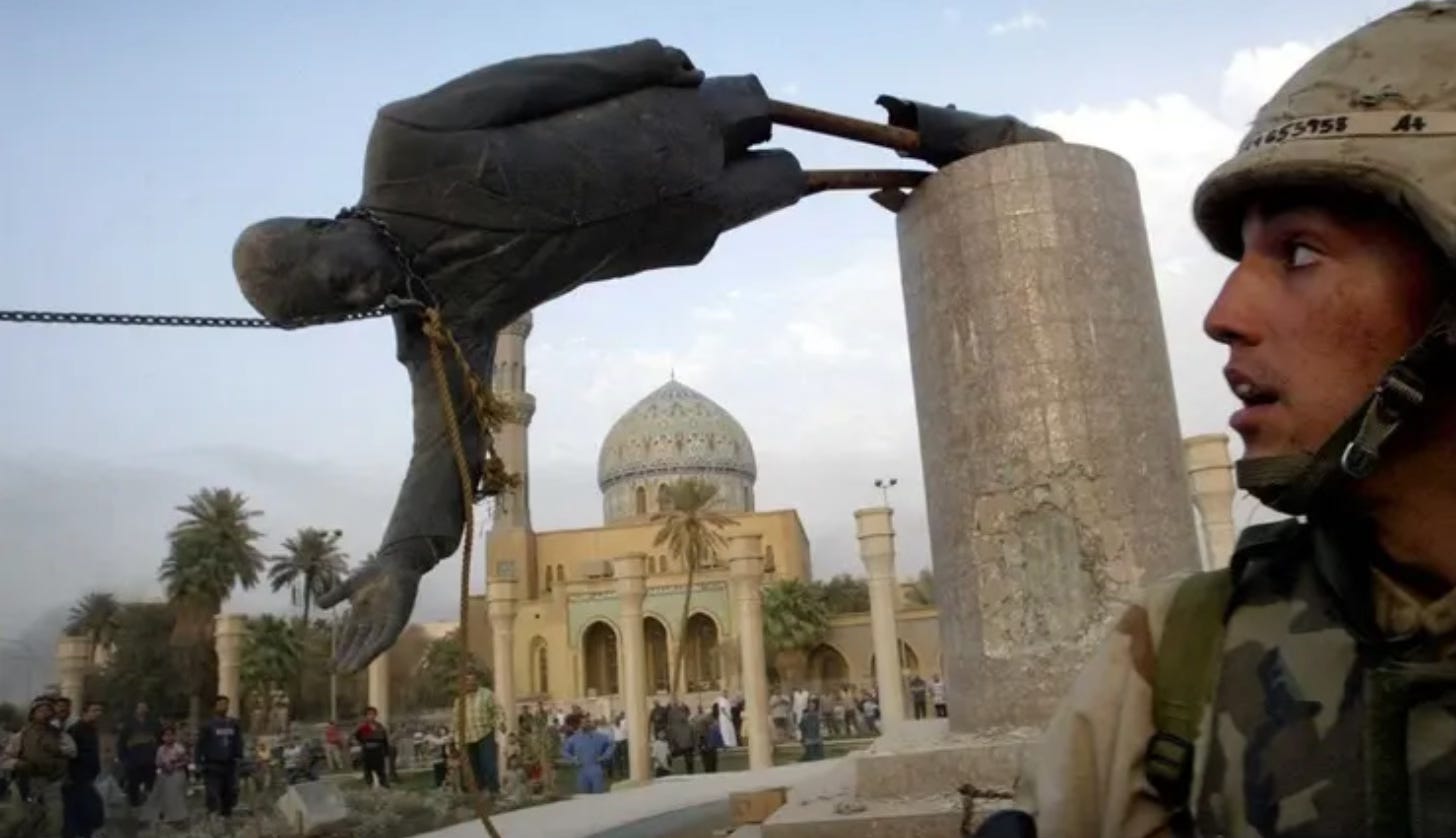It’s said everyone has a book in them yet still I was surprised to learn that Saddam Hussein published four novels, overseeing the first print run of “Begone Demons!” even as US tanks rolled into Baghdad. It’s not quite the stuff of motivational memes but I’m struck that if a tyrant whose dominion was skewered by the existential crisis of conflict with a global superpower could find time to write a 700 page novel about lovers in medieval Tikrit, then you can let yourself off the hook for the happy stolen hours you’ve recently devoted to your own creative work. Your tax, your kids, all your unanswered emails, they may press but none are tanks at the gates of your capital.
Or is Saddam’s literary enthusiasm a warning to all of us busily spewing out our Substacks that self-publishing truly is the last recourse of maniacs?
To be fair to Baghdad’s mass murdering dictator, once you govern with total authority all publishing is perforce self-publishing. Yes, it’s unlikely his manuscripts could have been strenuously edited but, like JK Rowling publishing as Robert Galbraith, the oppressive bully clearly craved honest feedback, publishing his first novel anonymously with the Delphic byline “Written by He who Wrote It”; a theatrical swoosh of logic that suggests Saddam might have rather enjoyed Rumsfeld’s equally oblique “unknown unknowns” speech. Who knows, perhaps Saddam took the anonymity thing seriously, pseudonymously enrolling on a creative writing course with the OU.
“Dear Dr.Sarah apologies for my late reply and thank you for your kind notes on the characterisation in my first three chapters, I take your point that the love between the King and the peasant girl Zabibah will seem more powerful if her cruel and unloving husband is a more rounded character and less clearly a portrait of the US government. I still argue though there’s no need for the King to tell the spies that he has already destroyed his weapons of mass destruction - they will surely believe him since it was they who gave him the weapons in the first place! If I may say Dr.Sarah I fear here perhaps your time working in Higher Education in the UK has left you maybe a little paranoid!!? Anyhoo must dash, work is off the hook atm so I’m behind on the next chapters but writing is where my heart lies so will be burning the midnight oil again to get this finished. Thanks again.”
Saddam’s books all seem to be thin allegories about embattled leaders beset by traitors which feels like an example of taking too far the maxim of “write what you know”. That said, currently there is no greater accolade in fiction than authenticity. Whether books or film or tv or theatre it’s increasingly less about making up than dressing up - clothing truth, ideally in something sheer that leaves little to the imagination. As a result one of the hardest problems I’ve encountered recently in my role as creative physician are the writers who have yet to live out the end of the personal stories they are trying to tell.
When simply making things up endings are easy to come by. It all goes wrong, it all goes right, whether happily or not the ever after embraces your characters, ushering them from our view like traitors in front of dawn’s firing squad. John Yorke still has the simplest diagnosis, for him the end is the opposite of the beginning. If your characters start out in love, the end is when they are finally parted. If they start wanting a child the end is either the delivery of a baby or being delivered from that want. If they start a murderous tyrant gifted powerful weapons they did not have, they will end hanging from a rope having failed to render up the weapons they no longer possessed.
However when Yorke’s maxim of storytelling meets the desire for authenticity it hits an unexpected problem. You’d think it simply a case of life failing to meet the simplistic demands of narrative. Love tears our characters apart but the housing crisis forces them to stay together. The child once born turns out to be a whole other ruinously complex person. Deposing the tyrant for short term political advance creates a lethal power vacuum. Life is mess upon mess upon mess.
But what I’ve noticed recently is more that when you’re in the middle of a problem, you yourself will struggle to believe the authenticity of your own inevitable ending. For instance, someone I worked with was trying to write through their own experience of serious trauma. The first half of the story was painful but utterly compelling. It wasn’t plainly biographical but the truth behind it, the authenticity of experience, illuminated the author’s fictions from within. However somewhere around the middle the searing clarity fell away and the story crumbled into a tragedy that felt oddly banal. It didn’t work as a story but it also didn’t feel authentic. In working with the author it became clear that they themselves were still so close to the original event that they could not believe a change could come. When telling an unresolved problem it is change, the essence of any story, that is the very thing that feels inauthentic.
But change isn’t just a comforting law of storytelling, it is the uncomfortable truth of the ephemeral span of our days, nothing is more authentic than change. However unwanted or impossible to imagine, change is inevitable. It might be sudden, huge, like tanks rolling into your city, it might be tiny or simply a matter of perception, the way a mad wild bastard can be an emperor one day and a fugitive the next without himself changing one jot. But whilst a story may grow from the ashes of another and contain the seeds of dozens more, though life is continuous, it is a continuous succession of endings. Endings are real.
So if you are struggling to write the story that matters most to you, the story of the mess you are in, then look carefully at where your story begins. If it starts in the horror of your trauma, the shame of your addiction, the guilt of your mistake, the pain of your separation, the frustration of your desire then wether you like it or not the end of that story will involve a change to this burden. That might be good news you currently can’t hear, currently don’t believe in but lets face it, you’ve been wrong in the past, right?
Delphic oracle that I am, rest assured that change rarely comes the way you expect. If you can’t believe it will get better at least accept that it will get different. If you cannot let yourself write bromides against hell what bleaker change can you find? If you start with your people betrayed by their allies the end isn’t necessarily you avenging yourself upon them, it might simply be realising that you too betrayed your people by writing shit books whilst the jet fighters tore the skies above your palace.
A long time ago I wrote a play that started with a selection of the gonzo poetry that US Secretary of Defence Donald Rumsfeld gave to the world in his press briefings during second Iraq War and it seems right to share them again here, not least because I genuinely think he captures a terrifying truth that still describes our world today.
The Unknown.
As we know,
There are known knowns.
There are things we know we know. We also know
There are known unknowns.
That is to say
We know there are some things
We do not know.
But there are also unknown unknowns, The ones we don't know
We don't know.
A Confession.
Once in a while,
I'm standing here, doing something. And I think,
"What in the world am I doing here?"
It's a big surprise.
Happenings.
You're going to be told lots of things.
You get told things every day that don't happen. It doesn't seem to bother people, they don't— It's printed in the press.
The world thinks all these things happen.
They never happened.
Everyone's so eager to get the story
Before in fact the story's there
That the world is constantly being fed
Things that haven't happened.
All I can tell you is,
It hasn't happened.
It's going to happen.
The Situation.
Things will not be necessarily continuous.
The fact that they are something other than perfectly continuous Ought not to be characterized as a pause.
There will be some things that people will see.
There will be some things that people won't see.
And life goes on.
My 9 week screenwriting course returns on September 26th in London and on zoom. I dismantle traditional writing advice to show how you can make narrative work for you so you can tell stories that are as unique as you are. Past students have described it as “a true masterclass in screenwriting” and “the best investment I’ve made in writing my screenplay” but don’t just take their words, find your own by booking here.
I also offer individual script feedback and writing mentoring just message me for details.





